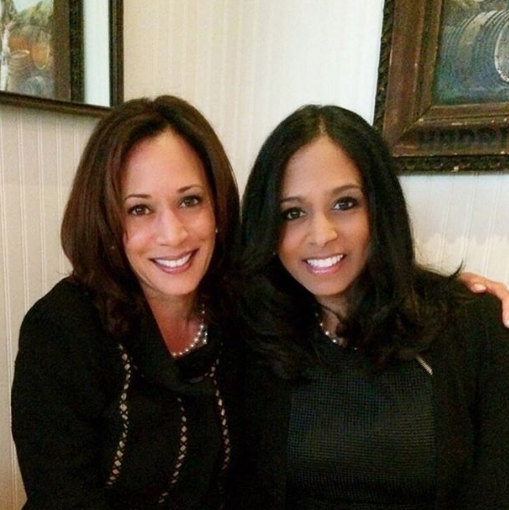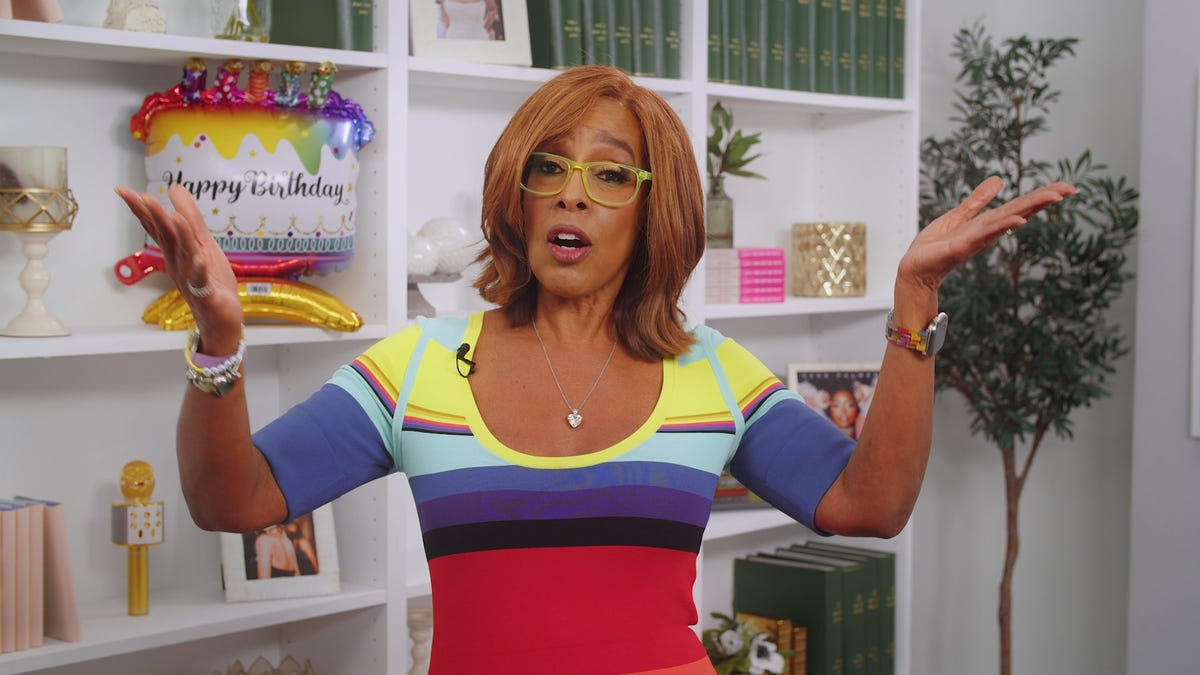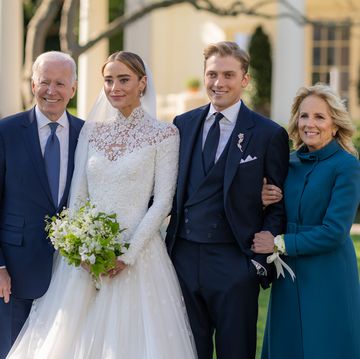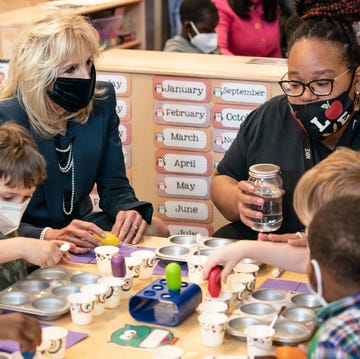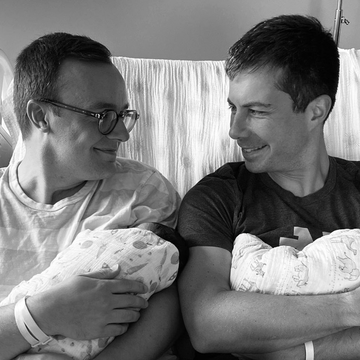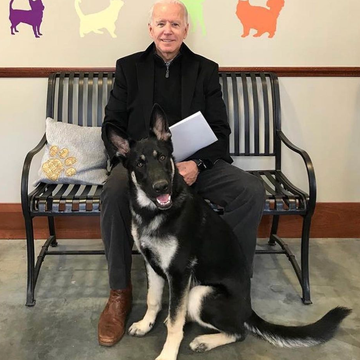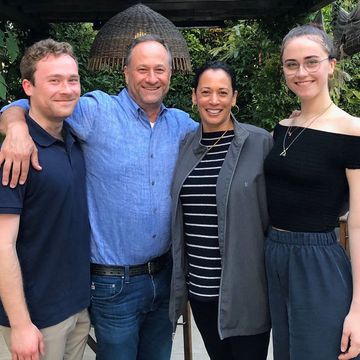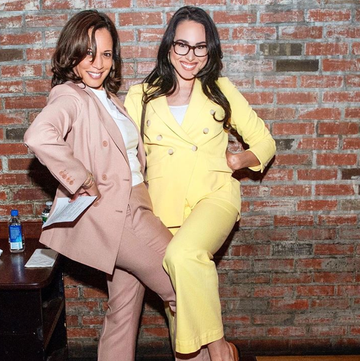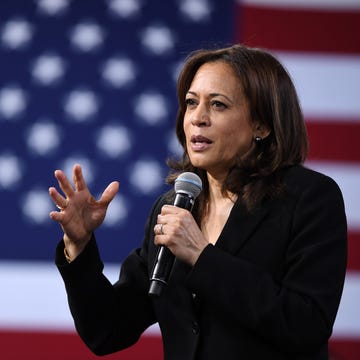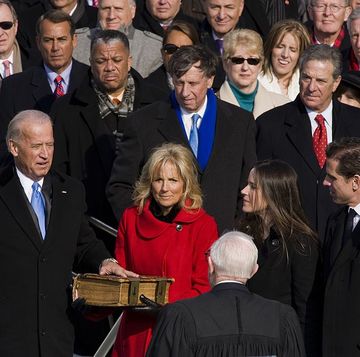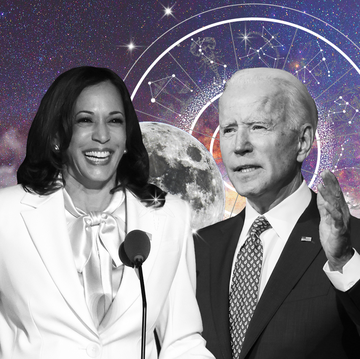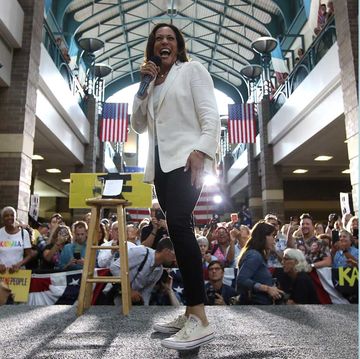- On January 20, Kamala Harris became the first female, first Black, and first Asian-American VP.
- When Harris was on the 2020 campaign trail herself, we learned more about her younger sister—and campaign chairwoman—Maya Harris.
- Here, some key facts about Maya, who has been by her sister's side since day one.
On January 20, 2021, following Joe Biden's official presidential victory, Kamala Harris was sworn in as the vice president of the United States. And while the former senator was surrounded by a mix of family members—including her husband, stepchildren, and niece—no one spent more time at the politician’s side than her younger sister, Maya. And for good reason: The 52-year-old was the 2020 hopeful’s presidential campaign chairwoman, all the way up until she dropped out of the race on December 3, 2019.
“I think most people who know Maya will tell you she’s one of the smartest people they know,” Kamala recently told Politico. “The fact that she has volunteered to work on this campaign at such a high level and she’s exactly who she’s always been—she works around the clock and she’s probably the hardest, if not one of the hardest working people on the campaign—I feel very blessed.”
It’s not uncommon for candidates to rely on family as they prepare to climb the political ladder; John F. Kennedy had brother Bobby Kennedy, George W. Bush and Jeb Bush had each other and their father George H.W. Bush. and Julian Castro has his twin brother, Joaquin Castro. Now that Harris is the VP, we expect we'll see more of Maya, too.
So with that in mind, we found out a few key facts about Kamala Harris's sister Maya Harris.
Kamala and Maya Harris have always been close friends and sisters.
On January 30, 1967, Shyamala Gopalan Harris, a breast cancer researcher who left India to get her doctorate at U.C. Berkeley, and Donald Harris, a Jamaican economist who taught at Stanford, welcomed their second daughter, Maya. A few years later, Shyamala separated from Donald, raising her two daughters largely on her own—earning the trio the nickname “Shyamala and the girls," according to Kamala's 2019 memoir, The Truths We Hold.
A Berkeley civil rights activist, Shyamala took the sisters to protests and marches from a young age. “I grew up with a stroller's-eye view of the civil rights movement,” Kamala wrote on an old campaign website. “I joke that as a child, I was surrounded by adults marching and shouting for this thing called justice.” So it's no surprise that from the time they were children, the two sisters fought for what they perceived as injustice. One example: When Maya and Kamala were 8 and 10 years old, respectively, they launched a successful campaign to turn an unused courtyard in their Bay Area apartment building into a playground.
A couple of years later, when their mom Shyamala accepted a job at McGill University, the threesome moved to Montreal, and the sisters—who were enrolled in a school where everyone else spoke French—became even closer. “We forged a bond that is unbreakable,” Kamala told the Washington Post. “When I think about it, all of the joyous moments in our lives, all of the challenging moments, all of the moments of transition, we have always been together.”
Maya Harris is a well-known civil rights lawyer and public policy advocate.
After graduating from Stanford Law School in 1992, Maya practiced corporate law, while also teaching law school classes on the side. At 29, she took the reins of the Lincoln Law School and became one of the nation’s youngest-ever law school deans.
From there, she followed in her mother’s footsteps, making a name for herself in the civil rights community. As a senior associate at the civil rights group PolicyLink, the executive director of the largest ACLU affiliate in the country, the American Civil Liberties Union of Northern California, and the vice president for democracy, rights, and justice at the Ford Foundation, Maya spent decades advocating for criminal justice reform and community policing. In an essay she wrote for Tavis Smiley’s best-selling book The Covenant with Black America, Maya said: “Something is clearly wrong when the government’s most effective affirmative action program is the preference people of color receive when entering not college but the criminal justice system.” She also helped edit her law school friend Michelle Alexander’s seminal book about the modern civil rights movement, The New Jim Crow.
She worked on Hillary Clinton’s 2016 presidential campaign.
It turns out her Senator sister's 2020 campaign is not Maya's first rodeo. In April 2015, Hillary Clinton hired Maya as one of three senior policy advisors for her presidential campaign. The choice was unexpected—in large part because Maya wasn't a longtime member of Clintonland. (In fact, the first time she met with Clinton professionally was just weeks before the announcement.) But once aboard, Maya quickly made her mark, focusing on issues like immigration, incarceration, the opioid epidemic, urban investment, and abortion rights. “Hillary really trusted her instincts,” Clinton campaign chairman John Podesta told Talking Points Memo. “Maya would cut through the bullshit, brief her quickly, and give her something to think about.”
While she might have been a fresh face in in the Clintons' world, Maya brought more than a decade of campaign experience: In 2003, Maya helped her big sister defeat two-term incumbent Terence Hallinan, becoming San Francisco’s first female and first African American District Attorney. It’s a position that Maya has reprised in every campaign since.
In April, she announced she has lupus—after battling the condition privately for more than three decades.
In March, President Donald Trump first touted hydryroxychloroquine as a potential treatment for COVID-19—despite serious pushback from the F.D.A. and experts like Dr. Anthony Fauci. The mention led to shortages that have put the lives of people with chronic conditions, like lupus, at risk. Shortly after, Maya came forward about her own battle with the autoimmune disease, which she was first diagnosed with in college. "One morning during my last semester in college, I woke up with a strange rash on my face," she wrote in The Atlantic. "When it didn't go away after exhausting a tube of over-the-counter cortisone, my mother persuaded me to see a doctor."
More than three decades later, Maya still struggles with the sides effects of the condition. "The physical effects of the disease are cruel, including excruciating joint pain, organ damage, dramatic hair loss, and debilitating fatigue—most of which I have experienced again and again, often for long stretches, throughout my life," she says. "And while lupus can be managed, it has no cure."
She has one daughter, Meena Harris—and two granddaughters.
In 1984, during her senior year of high school, Maya became pregnant—a part of her life that she’s fiercely private about. On October 20—which also happens to be her older sister's birthday—she gave birth to her daughter Meena.
A single mom, Maya stayed home while getting her undergraduate degree at the University of California-Berkeley and putting herself through Stanford Law School. That experience greatly inspired her civil rights work. “I was a single teenage parent and I could not have done what I’ve been able to do had I not had access to childcare and had I not had mechanisms for me to pay for both my college tuition and my law school tuition,” Maya said on MSNBC in 2014.
Meena, now 34, is a Stanford and Harvard-educated attorney, working to empower future generations of women—including her two young daughters—through the Phenomenal Woman Action Campaign, an organization that brings awareness to social causes. In June, she published her first children's book about the two sisters, titled Kamala and Maya's Big Idea.
She met her husband, Tony West, at Stanford Law School.
On the first day of classes, Maya’s four-year-old daughter Meena introduced her mom to West after engaging him in a game of hide-and-seek. The two quickly became close friends, but it wasn’t until a few years after graduation that they started dating. “We waited for the most inconvenient time to actually get together—he was in D.C. and I was in the Bay Area,” Maya told Stanford Lawyer. “It’s a family joke that Meena knew we should be together long before we did.”
Nearly a decade after they first met, the pair got married in 1998, and West would go on to become the third-highest ranking official in the Obama Justice Department, where he played a key role in the Obama administration’s decision to stop backing the Defense of Marriage Act (DOMA) on the grounds that it was unconstitutional. “It was one of the hardest things that I’ve ever been involved in and it is one of the things that I think will matter the most,” West, who now serves as General Counsel at Uber, told the Washington Post.
She officiated her sister Kamala's wedding to Douglas Emhoff.
In August 22, 2014, Kamala married Douglas Emhoff in a private ceremony at the Santa Barbara Courthouse. Not only did Maya officiate the ceremony, but she also helped both the bride and groom write their vows.
And she shares her big sister's laugh.
While the two might not look much alike at first glance, they do have the same explosive, hearty laugh—as seen in this video from a 2012 Daily Beast event, where the two joked about Kamala's fancy title:
One thing is clear: The sisters who laugh together, stay together.
For more ways to live your best life plus all things Oprah, sign up for our newsletter!
